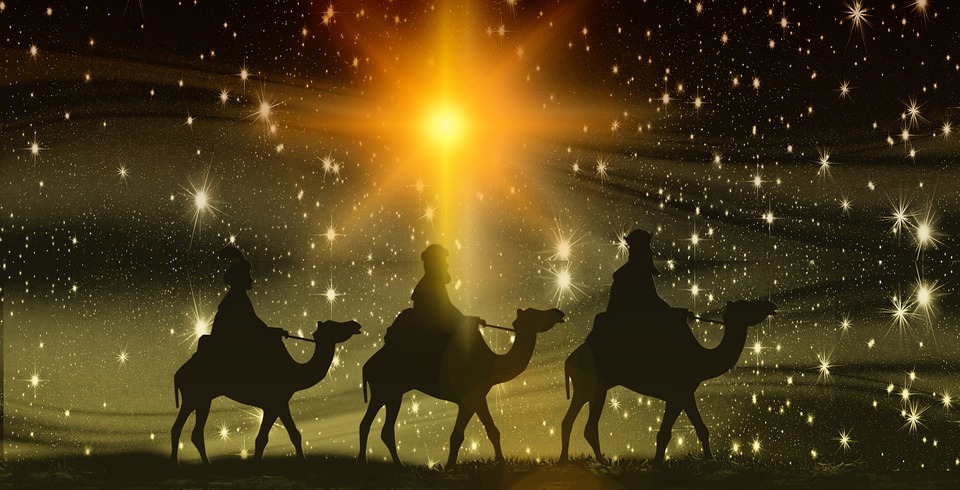This evening we are gathering to begin our study of the manifestations of Jesus as God beginning with the story of the Visitation of the Magi found in Matthew 2:1-12. As we sing in verse 1 of our hymn: Songs of thankfulness and praise,/Jesus, Lord, to you we raise,/manifested by the star/to the Magi from afar.
The Magi and Worship:
Matthew ends the story of the Visitation of the Magi by telling us that “going into the house they saw the child with Mary his mother, and they fell down and worshiped him. Then, opening their treasures, they offered him gifts, gold and frankincense and myrrh.” v.11. The Greek word used by Matthew for “worship” is proskuneo which literally means to “kiss the ground.” The English cognate is proskynesis.
According to Herodotus, proskynesis was a Persian (from where the Wise Men hailed) custom and is appropriate from a severe inferior to his superior, such as a commoner towards a king. In Greece and the Western world, however, proskynesis was only allowed towards a god. Again, according to Herodotus, when Alexander the Great attempted to import the custom of proskynesis into his court, his courtiers rebelled because Alexander was only a human being.
Judaism, and Matthew in particular, appears to be closer to the Greeks than the Persians. For example, in Matthew 4:10, Satan tells Jesus that he will give all the kingdoms of the world if Jesus will simply worship (proskynesis) him. Jesus responds with the quote “You shall worship (proskynesis) the Lord you God and him only shall you serve.” Likewise, in Acts 10, when Peter enters the house of Cornelius the Roman centurion, Luke tells us that Cornelius “fell down at the feet of Peter and worshipped (proskynesis) him. But Peter lifted his up saying ‘Stand up; I too am a man.’” v.25.
When Matthew tells his audience that the Magi “worshipped” Jesus, he is telling us that Jesus is God. (A very in-depth discussion of this term is HERE.)
The Magi’s Gifts:
The Magi bring Jesus three gifts – gold, incense, and myrrh. Gold is taken as the sign that Jesus is king – of Israel, of the universe, and of the kingdom to come (see below). Myrrh was used to anoint the dead (John 19:39), and this gift foreshadows Jesus’ death. It is the gift of frankincense that signifies that Jesus is God. Within the Temple, incense was used to signify the worship of God. In the Old Testament, the offerings made to God were commanded to include incense. Leviticus 2, 6. By offering incense, the Magi further proclaim the deity of Jesus.
The Magi and Revelation:
As we read through the Visitation, we should see this story (like much of Scripture) as not simply a historical occurrence but also as a typology of the world to come. In Advent, the Church looks both backward to the Nativity and forward to the Second Coming, and this dual perspective is shown in the Magi and their worship of Jesus. The daily office for the Epiphany (1979 BCP 942) includes a reading from Rev. 21:22-27. As we looked at in our study of this chapter, it is here that we find the culmination of God folding all the nations into his service, of which the Magi were the first. It is also here that we find the saints of God in the same position as the Magi – simply worshipping Jesus as the Christ, as the Lord, and as God.
SCHEDULE – Please remember that Cindy Craig is offering a women’s bible study at 10 a.m. on Thursday. They are using Beth Moore’s workbook on Daniel.
Dinner is at 6. The menu is chicken marbella. Discussion about 6:45. Compline at 8. If you have not joined us in a while, please consider making us a part of your new year. All you will need is a bible, and if you do not have one, we have extra here.
The kings, the first fruits of the Gentiles,
Byzantine Hymn for Compline on Christmas Eve.
Bring You gifts at Your birth in Bethlehem
From a mother who knew no travail.
With myrrh they point to Your death,
With gold, to Your royal power,
With frankincense to the preeminence of Your divinity.


Pingback: Epiphany – The Baptism of Jesus – Matt. 3 – Ancient Anglican